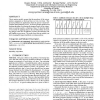Free Online Productivity Tools
i2Speak
i2Symbol
i2OCR
iTex2Img
iWeb2Print
iWeb2Shot
i2Type
iPdf2Split
iPdf2Merge
i2Bopomofo
i2Arabic
i2Style
i2Image
i2PDF
iLatex2Rtf
Sci2ools
KDD
2008
ACM
2008
ACM
A bayesian mixture model with linear regression mixing proportions
Classic mixture models assume that the prevalence of the various mixture components is fixed and does not vary over time. This presents problems for applications where the goal is to learn how complex data distributions evolve. We develop models and Bayesian learning algorithms for inferring the temporal trends of the components in a mixture model as a function of time. We show the utility of our models by applying them to the real-life problem of tracking changes in the rates of antibiotic resistance in Escherichia coli and Staphylococcus aureus. The results show that our methods can derive meaningful temporal antibiotic resistance patterns. Categories and Subject Descriptors G.3 [Mathematics of Computing]: PROBABILITY AND STATISTICS--reliability; H.2.8 [DATABASE MANAGEMENT]: Database Applications--algorithms General Terms Reliability, Algorithms
Classic Mixture Models | Data Mining | KDD 2008 | Temporal Antibiotic Resistance | Various Mixture Components |
| Added | 30 Nov 2009 |
| Updated | 30 Nov 2009 |
| Type | Conference |
| Year | 2008 |
| Where | KDD |
| Authors | Xiuyao Song, Chris Jermaine, Sanjay Ranka, John Gums |
Comments (0)

